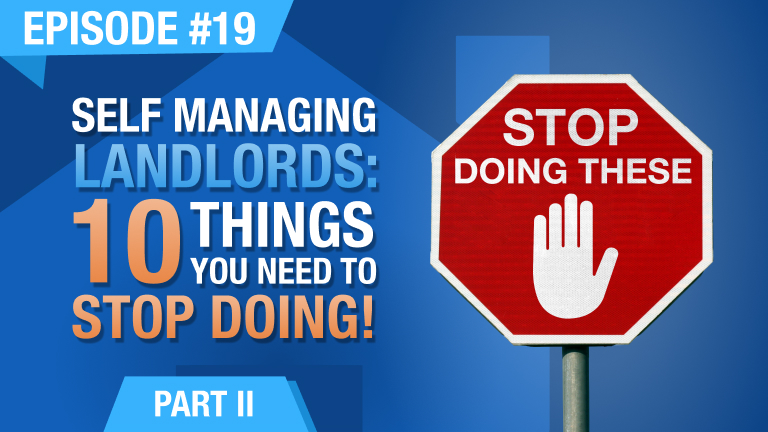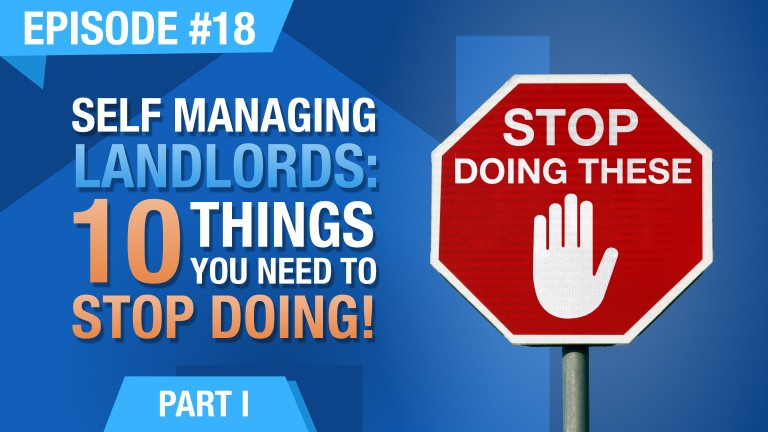Ep. #19 - Self-Managing Landlords - 10 Things You Need To Stop Doing! - Part 2

Show Episode Transcript
In last week's Episode (#18) we covered #1 thru #5 of the 10 Things That Self-Managing Landlords Need To Stop Doing. But due to time, I decided to split the list into 2 episodes. So if you've not already listened to the prior episode, please check that one out first and then continue here with Part 2, featuring #6 to #10 on the list. I get a little political here at points and go on a brief tangent, so please forgive me...
----------
Intro......
Welcome to Episode #19, Part 2 of "Self-Managing Landlords - 10 Things You Need To Stop Doing!"
So with #1 to #5 having been covered in last week's Episode #18, let's complete the list here with #6 thru #10.
----------
#6. Stop being ignorant of the law.
Landlord / Tenant Laws in your state and city or county set the rules of the game. You cannot play the game to win if you do not know and have a clear understanding of the rules.
Anything I do, I believe in doing it well. So in part, I decided to get my Real Estate Broker's License and become a Realtor for the education. It covers aspects of Property Management, Financials, Equal Housing Rights, and more. And while practicing law should be left to lawyers, knowing the law will go a long way towards keeping you out of court and situations where you need a lawyer.
Do you know what you can and cannot say in a rental listing? Do you know what are legitimate reasons for denying a certain applicant? What you can and cannot ask on an application or in a prospective tenant interview? What you can ask of references and prior landlords; or how you should respond to inquiries when you're the prior landlord?
Do you know how security deposits must be handled; how much they can be; how long you have to return them; what you can and cannot deduct from them; and how deductions must be reported? Do you know your responsibility for handling documents and private information of applicants and tenants?
It really does go on-and-on as to the various aspects of law you need to be familiar with as a Landlord - or you could easily end up in court facing a judgement against your assets.
Have you read your state Landlord / Tenant law? For North Carolina it's Chapter 42 (or 42A for Vacation Rentals) and you can find it by searching Google for keywords like "North Carolina General Assembly Landlord / Tenant Law" - or go to ncleg.gov - select [Bills & Laws], then [General Statutes]...
They provide HTML: https://www.ncleg.gov/EnactedLegislation/Statutes/HTML/ByChapter/Chapter_42.html
And PDF versions: https://www.ncleg.gov/EnactedLegislation/Statutes/PDF/ByChapter/Chapter_42.pdf
Read it! All of it... at least twice - and then seek legal counsel for anything you don't understand or have questions about. For those in other (less Landlord Friendly) markets, one area of North Carolina law that you may find compelling is 42-14.1 (Rent Control) - that says "No county or city may enact, maintain, or enforce any ordinance or resolution which regulates the amount of rent to be charged for privately owned, single-family or multiple unit residential or commercial rental property." - in other words, no rent control anywhere in North Carolina. North Carolina is a fairly Landlord friendly state.
So contact me and Blue Chariot if you need assistance getting investment properties here or need property management for your existing rentals.
But that's not to say that there are not many restrictions against Landlords in the law - so read it! Learn it! Know it completely. It's the law upon which your entire livelihood is based, so I (and you should) seek to get to the point of being able to site specific chapter and verse, like it were a Bible. You think someone will be foolish enough to take me or one of my Property Management client's to court when I can state off the top of my head exactly which chapter and verse of the law they should read to learn why they're going to lose any such dispute - and then have to pay my court costs as well, because I do everything according to the law? Sure, its possible and may happen someday, but this makes it unlikely and if so, it certainly won't be due to my having been ignorant of the law.
----------
#7. Stop using leases you got from Office Depot, Staples or just found somewhere on the Internet.
Listen to Episode #11 - Make Sure Your Lease Protects Your ASSets - for details on how you should be handling your lease. As I state in that episode, your lease can be both your sword and your shield in dealing with tenant issues.
And if you do take the time to read your state Landlord / Tenant Law, and if its anything like North Carolina - you'll find certain references to things the Tenant is NOT responsible for "unless he so contracts" (or similar language). This means that unless your lease (the contract) states otherwise, the Tenant is not responsible for that item or element or matter. So if you end up there, you may be in court thinking the Tenant will clearly be held liable for something, only to find out that the default position of the law is NOT. But your lease, if it says that they are, then they are - but only if it's covered in the lease to place the burden on the Tenant, as the law's default position may be to place the burden on YOU (the Landlord).
Some template lease you got from some random website or store is unlikely to address all potential matters properly and in your favor. You not only want a state specific lease drawn up by a lawyer in your state or from a site or service that keeps current with your state law - but you also want it customized to your specific situation, best practices, policies and procedures.
And then you want to be able to explain it and reference it properly at tenant on-boarding and in all tenant communication that may speak on an issue or matter covered by the lease. Doing so can save you many issues and headaches.
Anything's possible, but you're far less likely to end up being taken to court someday because a tenant was upset that you deducted a cleaning fee or some other damage done from their security deposit at exit. Or that you charge them as additional rent due in the following month for a plumbing bill from clearing a clog that they caused.
Such matters are much more easily resolved when you can point to the specific page and paragraph of the lease that they signed at tenancy start which explains the policy and this exact handling. And when you refer to the same in each communication with the tenant. And when you went over the critical elements of the lease with the tenant during the on-boarding (preferably on video) where they confirmed to have read the lease TWICE. All this contributes to making it hard to dispute the lease later.
But that really only applies if you have a state specific lease that has been customized to your exact policies and procedures.
----------
#8. Stop using cheap finishes in your rentals.
This weekend I was in a partially furnished rental home that was certainly valued at over $300,000 - with WHITE appliances in the kitchen. I put stainless steel appliances in my rental homes that are 1/3 the value. Now if it already had white appliances when I bought it, and they are in perfectly fine condition and good working order, then sure - but if I'm buying new appliances anyway, pay the extra few hundred dollars to put in stainless steel. It will make your pictures pop and make the home more desirable even at a slightly higher rent. And the new appliances are a tax deduction anyway! And likely to be fanciable at 0% interest for like a year or year and a half or more!
So you may be able to pay for the monthly cost of the upgraded appliances with the additional rent you can get by having the better appliances in your rental. And its hard to know and quantify, but your tenant may stay longer (saving on tenant turnover expenses) because of the feeling your upgraded appliances and other improvements give them for the home.
So go ahead and improve your rentals, increase your tax deductible expenses, while increasing the desirability and likely rent for the home, thereby potentially increasing income. And like I said, when a tenant really loves a home, they are likely to remain longer - thereby lowering your vacancy and tenant turn-over expenses.
So upgrade! Put in granite counters, tile floors, resurface kitchen cabinets and bath vanities. Improve the vanity tops. Put in upgraded light fixtures. And while I don't do hardwood flooring in rentals, I love the so called "luxury" vinyl plank flooring that is durable, waterproof and looks great. Whenever I'm replacing flooring anyway, I go with that over carpet every time. It last for years potentially spanning multiple tenants, and so any increased cost upfront is quickly recaptured - and again, it's a tax deductible expense to begin with and likely able to be financed at 0% interest for a year or more.
So while not over-improving for the location, property class and rent range - make your rentals really nice and durable (tenant proof), put in decent tenants, and inspect regularly. Which brings me to the next item on my list...
----------
#9. Stop failing to conduct rental property inspections.
So you put a tenant into your rental home that may be valued at $150,000 (granted maybe yours is worth a lot less than that, but possibly a lot more) - but regardless, it's your Real Estate asset upon which your present day passive income and future retirement dreams are based, and you never step foot in the home again during the tenancy!?
Stop putting tenants into your rentals and going ghost - never showing your face again for months and years. I inspect each of my rental homes as often as quarterly in the beginning. Then depending on how those first inspections went, I may drop back to semi-annual - which goes even for those tenants I've had for years. Even if every inspection has been passed without issue, I still inspect each rental at least twice per year - NO EXCEPTIONS!
Yet most Landlords (even those with so called Professional Property Management in place), rarely (if ever) step foot into their rental homes (or have someone do so on their behalf) after a tenant is in place. And then you wonder how your home got trashed so badly. It likely didn't happen over night.
Had you stopped by from time to time for an inspection and made it known to the tenant that you'd be doing so on a regular basis - just that knowledge is often enough to effect tenant behavior to the benefit of the Landlord and your property. It also turns away potentially problem tenants who don't want to deal with inspections, as they know they won't pass. And I'm not talking about surprise visits (that's likely illegal in your state, as it is in mine, other than for legitimate emergencies like flood or fire) - see #6 earlier about knowing the laws. I'm talking about scheduled and announced visits, so the tenant knows well in advance exactly when you are coming and why (for an inspection, as should be detailed in your lease) - see #7 about your lease.
----------
#10. Stop denying potentially great tenants based upon their credit score - (political opinion alert).
Some of my best tenants had horrible credit scores. And if you look closely at their credit report, you'll see that the reason for many applicants having poor credit scores is often due to student loans and medical bills. Well if politics were the focus of this Podcast, I could do an entire episode on the financial crime that is being committed against a generation of young people - charging them all-time high amounts for tuition and text books to often obtain worthless degrees. Having them take out loans to pay for it all that cannot be discharged through bankruptcy, so they follow them around for life and ruin their credit. Which then means they cannot get decent housing (because you and other Landlords deny them over credit) - and even if their degree wasn't worthless (which it often is), they likely can't get a decent job either (also due to their poor credit).
Now I'll try to avoid my tendency to speak on matters of politics (that's not the focus of this show), but I'll just say that if the government wasn't guaranteeing student loans, and students had to pay for their own education directly - it would cost a fraction of what it does now to get an education. And then far more people could afford it, without killing their credit by taking out loans that far exceed what they can ever hope to repay with the job their degree may qualify them to obtain if it wasn't worthless.
And then medical bills also becomes a political discussion, because just like with education, when the person receiving the benefit is not likely the person paying the bill, then prices skyrocket (EVERY TIME). If you placed a claim against your car insurance each time you needed an oil change, or a new battery or tires - auto insurance would cost over $1,000/mo and an oil change would cost like $500 or more. Likewise, every time we go to the doctor for any reason, it's paid by insurance most often, which is one of many reasons why medical anything cost so much. And if you or your child is sick or injured, you're going to the hospital regardless of what it costs. And if you don't have great insurance, you're going to end up with a medical bill that you cannot pay - and your credit is going to be ruined as a result. so now that should prevent you from having decent housing or getting a job!? I'm a pretty conservative guy in my political views, but I just don't think so.
So, sorry for the tangent - I stopped debating matters of politics when I needed to focus on learning the business of Real Estate - but I do have some pretty well established political beliefs - maybe I'll run for congress in 10 years or so. But my point is that low credit scores due to past due student loans or delinquent medical bills are irrelevant to me... Don't care! What I do care about are collections for utilities (electric and water), phone, cable - and other things that are daily household bills that are not a government price inflated trap that anyone of us could fall into - as in many cases you have no choice. I care about liens, judgments, repossessions, and collections - that are non-medial or student loan related.
I'm not going to deny someone housing because they got treatment for their sick or injured child and the hospital charged them $800 or a bandage (thinking it would be paid by insurance, but it wasn't). I'm also not going to deny someone housing because they tried to better themselves with education and a corrupt system dumped $200,000 of student loans on them for a degree that might earn them $50,000 per year if they're lucky.
You can't likely buy a $200,000 house on $50,000 per year of income, but you can get student loans that are even worse. As with the house you can at least file bankruptcy or let it be foreclosed upon - but you're stuck with the student loans for life! And many times you don't even obtain the degree, because you're tapped out on loans before you get there. Shameful what's being done right now to young people. There should be a student loan revolt where everyone just stops paying. But here I go again speaking on politics. And I'm sure someone will argue that they knew what they were getting into and agreed to take the loan.
Yea, sure setup a system where you're almost required to have a degree to be employable; make that degree like 4 times more expensive than it should be (and was just 30 years or so ago); and then blame the person for agreeing to pay the inflated price for the often worthless degree (like they had much of a choice) - who then can't get a job paying enough to afford to pay the bills. And then Landlords and employers use their now poor credit as an excuse to deny housing and employment. That's fowl and it cannot continue - and I won't participate by being one of those Landlords denying prospective tenants based upon credit score. I need to see something else of concern on their credit report besides student loans and medical bill related collections. I care far more about a $50 cell phone bill or cable bill collection than I do about a $50,000 delinquent student loan or $5,000 of unpaid medical bills. I don't care about those at all! And I don't think you should either if you're a Landlord.
So stop setting blanket credit score requirements. I see all the time where Landlords refuse to accept anyone with a credit score lower than X, with X being 600 or maybe 620. And at least some go lower, like 580, but any blanket number is just lazy in my opinion. Look at the report and see WHY the score is low, and if its student loans or medical bills, then ignore that... I feel like cussing.
And if it makes you feel better, you can always use the score and other factors as justification for charging a higher security deposit. I advertise my rentals at 1.5x rent as the security deposit amount, and I may lower it to 1x rent for better quantified applicants; or increase it to 2x for those with more significant credit challenges - where nothing else is a disqualifying factor.
----------
OK, now I'm thinking about politics... I could continue this list with #11 and beyond, but now I'm on my soap box (as the expression goes) - so everything I say from here on will likely have a heavy political bent. For that reason, I'll stop it here... 10 is a nice round number, and if you implement these changes into your Landlord business, it will be greatly improved and you're much more likely to be successful. And as I've mentioned before... If you don't want to have to deal with any of this and you're in the Raleigh / Durham area of North Carolina - hire me and my team at Blue Chariot Management to take over your Rental Property Management duties on your behalf. Checkout the website at: BlueChariot.Management (not .COM / .Management and no need to start it with www) - because its not 1996 and we no longer call it the World Wide Web.
----------
Outro...
Disclaimer...
This is Part 2 of "Self-Managing Landlords - 10 Things You Need To Stop Doing!" - which features #6 to #10. See last week's Episode (#18) for #1 to #5 on this list of 10 things you just need to stop doing (if you're a Landlord).
So in this 19th Episode of the […and Landlord!] Rental Real Estate Investing Podcast, I continue to speak on Self Managing Landlords - completing my list of 10 Things You Need To Stop Doing! Last week's episode got a little long, so I decided to split it into two episodes, with this being the 2nd.
And here in this 2nd episode on the topic (19th overall), I get a little political in #10 - so please forgive me, because matters of politics is not really supposed to be the focus of this Podcast.
The second 5 of 10 Things That Self-Managing Landlords Need To Stop Doing - covered in this episode, include…
6. Stop Being Ignorant Of The Law.
7. Stop Using Leases You Got From Office Depot, Staples Or Just Found Somewhere On The Internet.
8. Stop Using Cheap Finishes In Your Rentals.
9. Stop Failing To Conduct Rental Property Inspections.
10. Stop Denying Potentially Great Tenants Based Upon Their Credit Score - (Political Opinion Alert).
If you've not already, checkout Episode #18 to hear the first 5 of 10 Things That Self-Managing Landlords Need To Stop Doing. Unfortunately, all 10 items on the list are things that are common for Self-Managing Landlords - and I've been guilty of some of them myself at the start of my Real Estate endeavor. And it has been my experience that the longer a person has been a Landlord, the more likely they are to be guilty of multiple things on this list - like those who started in the business decades ago.
If you're going to be a Self-Managing Landlord, then you need to stop doing these things. Or, you should outsource your Rental Property Management to a professional like me and my team at Blue Chariot Management.



